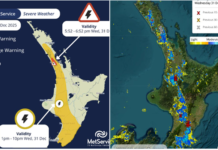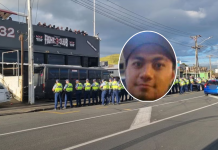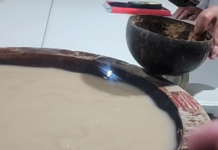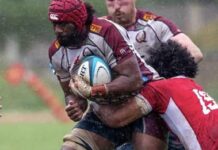Tongan Prime Minister ‘Akilisi Pohiva told a Tongan audience in Auckland the Tongan people would be better off if they learned the Chinese lifestyle and that he had a vision the two races would intermarry one day.
He said the Chinese were hard working people and he wanted to develop policies that would help blend the two cultures so that Chinese and Tongans lived together in harmony.
Hon Pohiva made the statement in response to comments made during a meeting with Tongans in New Zealand on Monday, suggesting his government should protect Tonga’s image at home and overseas.
The long-time democratic campaigner was in Auckland after he was invited to join a meeting of the eight members of the Polynesian Leaders Group.
More than 500 people gathered at Lotofale’ia Methodist Church hall to welcome the Prime Minister.
Issues raised during the meeting included the poor performance of civil servants, the reformation of some cultural activities and the often violent reactions to Chinese businesses in Tonga.
The Prime Minister agreed with suggestions that the best way forward was to have policies to help change the mindset of Tongans.
People speaking at the meeting said the success of the new system would rely on how people saw a government they owned politically operated on democratic principles of transparency, accountability and good governance.
The Tongan government was ruled by a monarchy from 950AD until 2010 when democratic reforms amended the constitution to give the people a greater voice through a popularly elected government.
Hon Pohiva said in the four weeks since his government came to power they had concentrated on tidying up work that had been left behind by the former administration.
“We wanted to know what the actual assets the government has locally and outside Tonga,” the Prime Minister said.
“This includes finding out what money the government owes to creditors and what money debtors owe to the government.”
He said his government would start operating fully in July when the new fiscal year starts.

Chinese in Tonga
During the meeting Tongan Lawyer ‘Amelia Schaaf said she was concerned about the way Chinese people were treated in Tonga.
She talked about the anti-Chinese riots and the burning of Chinese business in Nuku’alofa in 2006.
Hon Pohiva said that during the 1980s the Tongan government sold Tongan passports to more than 400 Chinese.
He took the government to court on the issue, but the then king summoned a special cabinet meeting to amend the constitution to legalise the sale of the passports.
Hon Pohiva told the audience he had put the issue behind him and regarded those Chinese who lived in the kingdom as Tongans. He said there was no choice but to treat the Chinese as brothers and sisters.
The Prime Minister said that while in opposition he held two meetings with the Chinese to make sure the Chinese felt at home in Tonga and make Tonga as their new homeland.
Hon Pohiva said Tongans should copy Chinese lifestyles and standard of living as their hard working attitude would help Tonga’s economy.
He said the Chinese went to bed late at night, but were the first to get to work in the morning while some Tongans spent all night drinking kava and sleeping the next day.
Hon Pohiva said his government might be able to create projects to utilise uncultivated lands and bring the Chinese and Tongans together to work on those projects.
He said that through these projects Tongans would learn the way Chinese people worked and saved money.
Hon Pohiva said he had a dream that one day the Chinese and the Tongans would walk hand in hand and marry each other.
The Prime Minister, who is also the Minister of Education, said that while Tonga braced for the King’s coronation in July he would like to see Tongan and Chinese children performing together for His Majesty.
He said this would help confirm to the Chinese that his policy was to help them feel that Tonga was theirs as much as it was to an indigenous Tongan.
Civil servants
One man in the audience told the Prime Minister he had been living in New Zealand for years and was surprised when he returned to the kingdom recently that some civil servants did not immediately attend to customers with care and respect.
The man said he was trying to fulfil some commitments that dealt directly with some of the government offices, but they were not completed before he returned to New Zealand.
“When you go to the office the clerks just sit and talk and do their own things,” the man told the Prime Minister. His comments received a murmur of affirmation from the audience.
The Prime Minister said it required a lot of effort to change the attitude of the civil servants and he had told local media to keep close eyes on the government ministries.
He said he needed the media to report as much as possible any misdemeanours they could find.
Religion
A woman asked Pohiva what he thought about religion in Tonga. She said it should be reformed, implying it had become a barrier to most of the government’s economic development plans.
In Tonga there is no business on Sunday and most Tongan businesses close when operators want to attend church or cultural activity during the week. On the other hand, Chinese businesses open 24 hours a day and only close on Sundays.
Hon Pohiva told the meeting the issue of religion in Tonga the woman had raised was very delicate to discuss.
However he gave a story for the meeting to think about in terms of religion in Tonga.
He said the International Transparency was a reputable organisation that monitored and publicises corporate and political corruption in about 180 countries.
The Prime Minister said in its most recent reports the international body placed Tonga as number 3.5, which meant corruption in Tonga was high.
Economic policy
Another woman asked Hon Pohiva whether his government had economic policies in place and what they were.
In response the Prime Minister said his Democratic Party had repeatedly announced its policies prior to the 2014 general election.
He said Tonga’s economic problems were not the result of a lack of economic policies and expertise, but the high level of corruption among government leaders.
He said his government strictly monitored his ministers’ discipline and emphasised they had to perform their duties decently and honestly and for the best interest of the public.
The Prime Minister said heaps of good economic policies and plans had been piled up at the Planning Department for ages, but had never been put into practice.
Hon. Pohiva said that in Parliament he repeatedly quoted what he said was one of the oldest economic policies in the world; the passage in Genesis in which God tells Adam: “By the sweat of your brow shall you eat bread.”
The long-time political veteran said the government had a responsibility to educate the people to work the land and make use of whatever resources Tonga has so they could start to build economically under the new democratic system.
Hon Pohiva said there was still plenty of uncultivated land in Tonga, but some people seemed reluctant to use them to earn a living.
Critics
Responding to a question regarding the Prime Minister’s appointment of his son Po’oi Pohiva, as his personal assistant Hon Pohiva said he thought that was his best selection. He said his son knew him, especially as he is now 73.
He said his son was not paid by the government, but from his own salary.
The Public Service Commission has issued a statement saying the Prime Minister was free by law to choose his own personal assistant and driver, just as former government ministers did.
Rev Tevita Finau told the meeting he thought the Prime Minister’s son should be paid by the government and not from the Prime minister’s salary.
Applause for Pohiva at meeting
Monday’s meeting began with huge applause from the audience after the Acting Secretary to Cabinet, Mr ‘Aholotu Palu introduced the Prime Minister.
Palu said he was surprised when Hon Pohiva told him to contact ‘Atalanga, the Tongan government residence in Epsom, Auckland and ask if there was a room there for them to stay in during their visit.
Mr Palu, who was Acting Secretary for the former government’s cabinet, said he was emotional when he heard what the Prime Minister has asked.
“It sounded new but I can only see the love for the nation reflected on Pohiva’s attitude,” Palu told the audience.
“The Prime Minister told me to ask Stafford Aho (Tonga’s consul in ‘Atalanga) if there was part of the manger available in ‘Atalanga they could use when they arrived,” Palu told the audience in Tongan in which it received an applause .
Palu said for him and the Prime Minister to stay in ‘Atalanga and fly to New Zealand in economy class had saved government a lot of money.
More than 500 people gathered at Lotofale’ia Methodist Church hall to welcome the Prime Minister. The hall was full and people outside listened through the windows to the leader who has been fighting a political war for 30 years to allow the Tongan people to run the government.
During the meeting there was regular applauses, positive facial expressions, murmurs and signs of affirmation from the audience while Hon. Pohiva spoke.
The main points
- Tongan Prime Minister ‘Akiklisi Pohiva believes Tongans and Chinese should both be able to call the kingdom home.
- Speaking to a meeting in Auckland on Monday (February 2), Hon Poviha said he wanted Chinese and Tongans to live together harmoniously.
- He said Tongans could learn a lot from Chinese work habits.
- He said people needed to change their attitudes to benefit from Tonga’s new democratic institutions.
For more information







